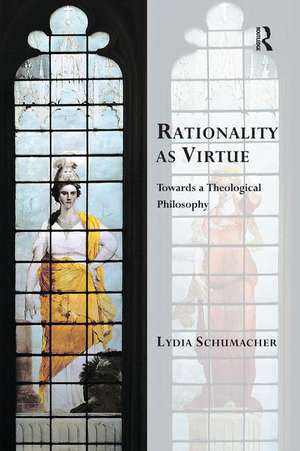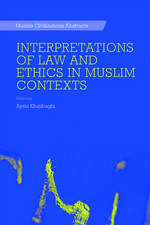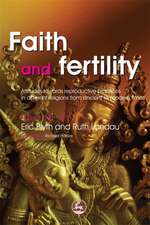Rationality as Virtue: Towards a Theological Philosophy: Transcending Boundaries in Philosophy and Theology
Autor Lydia Schumacheren Limba Engleză Paperback – 31 mar 2017
| Toate formatele și edițiile | Preț | Express |
|---|---|---|
| Paperback (1) | 389.38 lei 6-8 săpt. | |
| Taylor & Francis – 31 mar 2017 | 389.38 lei 6-8 săpt. | |
| Hardback (1) | 1005.80 lei 6-8 săpt. | |
| Taylor & Francis – 28 aug 2015 | 1005.80 lei 6-8 săpt. |
Din seria Transcending Boundaries in Philosophy and Theology
-
 Preț: 411.81 lei
Preț: 411.81 lei -
 Preț: 411.64 lei
Preț: 411.64 lei -
 Preț: 414.32 lei
Preț: 414.32 lei -
 Preț: 386.39 lei
Preț: 386.39 lei -
 Preț: 462.81 lei
Preț: 462.81 lei -
 Preț: 385.47 lei
Preț: 385.47 lei -
 Preț: 469.34 lei
Preț: 469.34 lei -
 Preț: 469.34 lei
Preț: 469.34 lei -
 Preț: 382.36 lei
Preț: 382.36 lei -
 Preț: 415.24 lei
Preț: 415.24 lei -
 Preț: 384.86 lei
Preț: 384.86 lei - 22%
 Preț: 258.14 lei
Preț: 258.14 lei -
 Preț: 436.14 lei
Preț: 436.14 lei -
 Preț: 409.51 lei
Preț: 409.51 lei - 13%
 Preț: 309.63 lei
Preț: 309.63 lei -
 Preț: 386.39 lei
Preț: 386.39 lei -
 Preț: 363.00 lei
Preț: 363.00 lei - 18%
 Preț: 844.81 lei
Preț: 844.81 lei -
 Preț: 442.07 lei
Preț: 442.07 lei -
 Preț: 382.75 lei
Preț: 382.75 lei
Preț: 389.38 lei
Nou
Puncte Express: 584
Preț estimativ în valută:
74.52€ • 80.91$ • 62.59£
74.52€ • 80.91$ • 62.59£
Carte tipărită la comandă
Livrare economică 23 aprilie-07 mai
Preluare comenzi: 021 569.72.76
Specificații
ISBN-13: 9781138053274
ISBN-10: 1138053279
Pagini: 242
Dimensiuni: 156 x 234 x 13 mm
Greutate: 0.45 kg
Ediția:1
Editura: Taylor & Francis
Colecția Routledge
Seria Transcending Boundaries in Philosophy and Theology
Locul publicării:Oxford, United Kingdom
ISBN-10: 1138053279
Pagini: 242
Dimensiuni: 156 x 234 x 13 mm
Greutate: 0.45 kg
Ediția:1
Editura: Taylor & Francis
Colecția Routledge
Seria Transcending Boundaries in Philosophy and Theology
Locul publicării:Oxford, United Kingdom
Notă biografică
Dr Lydia Schumacher is Chancellor's Fellow at the University of Edinburgh, School of Divinity. Her previous books include Divine Illumination: The History and Future of Augustine’s Theory of Knowledge and the three-volume Oxford Guide to the Historical Reception of Augustine, for which she served as both co-editor and contributor.
Recenzii
’Schumacher advances the bold claim that the Christian life establishes not just the plausibility or attractiveness, but the rationality of faith. In this first installment of an ambitious two-part project, she patiently assembles a pro-theology philosophy, i.e., a teleological account of rationality as inherently ordered to ethical ends. The pursuit of knowledge is shown as fully intelligible only when placed within the context of the task of perfecting ourselves as the particular kind of creatures we are. The result is a significant and original contribution that ranges ably over the terrain of ontology, theory of knowledge, virtue epistemology, and virtue ethics.’ Jennifer Herdt, Yale Divinity School, USA ’Schumacher provides a sophisticated account of how reason and faith should be understood by Christians and philosophers not sympathetic to Christianity. She draws on the work of classical theologians while also paying attention to contemporary thinkers. And she does so to good effect.’ Brian Davies, Fordham University, USA
Cuprins
Introduction to Rationality as Virtue; Necessary Conditions for Pro-Theology Philosophy; The Ontology of Participation; The Ontology of Knowledge; The Conditions for Knowledge; Rationality; Sufficient Conditions for Pro-Theology Philosophy; Deficient Conditions for Pro-Theology Philosophy; Sufficient Conditions for Pro-Theology Philosophy; Towards a Theological Philosophy;
Descriere
For much of the modern period, theologians and philosophers of religion have struggled with the problem of proving that it is rational to believe in God. Drawing on the thought of Thomas Aquinas, this book, a companion to Theological Philosophy, lays the foundation for an innovative effort to overturn the longstanding problem of proving faith's rationality, and to establish instead that rationality requires to be explained by appeals to faith. To this end, Schumacher advances the constructive argument that rationality is not only an epistemological question concerning the soundness of human thoughts, which she defines in terms of ’intellectual virtue’.













